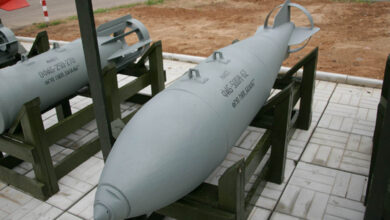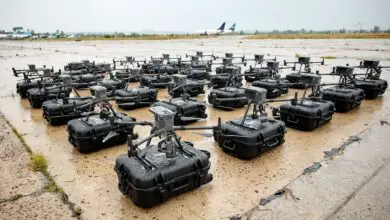AI Can Change Nearly Every Aspect of the Battlefield, Esper Says
The secretary of defense said the US can’t afford to cede ground in this field to “revisionist” powers such as Russia and China.
US Secretary of Defense Mark Esper reiterated the importance of ethical principles for the American military as it seeks to become a dominant player in the field of artificial intelligence (AI).
“We approach AI as we have other high-tech breakthroughs throughout our department’s history — with rigorous standards for testing and fielding capabilities and the highest ethical expectations,” Esper said at the virtual Joint Artificial Intelligence Center symposium Wednesday.
Acknowledging the strides other countries have made in AI technology, Esper said the US can’t afford to cede ground in this field to the “revisionist” powers, as it’s key to the outcome of future combat zones.
“Artificial intelligence is in a league of its own, with the potential to transform nearly every aspect of the battlefield, from the back office to the front lines,” he explained.
Referring to the 1990-91 Gulf War, where American smart bombs, stealth aircraft, and satellite-enabled GPS helped in the decimation of Iraqi forces which had Soviet weapons, Esper said that “those who are first to harness once-in-a-generation technologies often have a decisive advantage on the battlefield for years to come.”
Russia, China, and AI
Giving the example of Russia, Esper said that Moscow has increased investment in the technology and wants to use it to “chip away at the sovereignty of others.”
When Russia invaded Ukraine in 2014, it used a calculated combination of drones, cyberattacks, and artillery barrages. “Since then, Moscow has announced the development of AI-enabled autonomous systems across ground vehicles, aircraft, nuclear submarines and command and control,” Esper said. He expects the country to use such systems in future conflicts.
Taking on China, the secretary of defense said Beijing is investing heavily in AI for the dual purpose of improving its military capabilities and to surveil its population for dissent.
Chinese weapon manufacturers are already selling autonomous drones they claim can conduct lethal, targeted strikes, Esper said. “Meanwhile, the Chinese government is advancing the development of next-generation stealth UAVs [unmanned aerial vehicles], which they are preparing to export internationally,” he added.
Ethics
Esper stressed that while technology will always change, America’s commitment to its core values will not.
To that end, the Department of Defense (DoD) earlier this year formally adopted five principles for the ethical development of artificial intelligence capabilities.
The principles of reliability, equitability, responsibility, traceability, and governability will be at the heart of the US’ AI technology’s design, development, and deployment.
Touting the work the DoD’s Joint Artificial Intelligence Center (JAIC) is doing in this field, Esper said that the center is “utilizing every aspect of artificial intelligence as a transformative instrument at home and abroad.”
AI and the Battlefield
Zachary S. Davis, a senior fellow at the Center for Global Security Research, wrote in his paper Artificial Intelligence on the Battlefield that AI can affect wars both operationally and strategically.
At the operational level, AI-enabled autonomous vehicles of the land, air, and sea can find their way through hostile terrain, where conventional weapons and military personnel are unable to go, and exploit “battlefield opportunities.”
AI, Davis further wrote, can also be used for simulation and modeling to study nuclear and conventional weapons without actually testing them. AI is also used in wargaming and battlefield simulations, where it is used to explore how different conditions — such weapons, allies, and intervention — may alter outcomes and decisionmaking.
At the strategic level, AI can be utilized to cull satellite and drone images to find things of military importance, such as missiles, troops, and other intelligence.
AI can also be used to select and target enemies’ strategic assets like aircraft carriers, missiles, or nuclear bombs.











